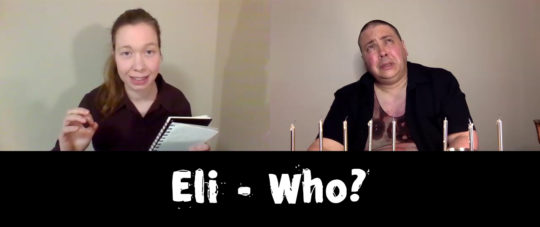Eli-Who? The mysterious man in The Book of Job

This is a segment from my new Discussion Guide, “Sitting With Job”.
To learn more, go to: www.Job.TheBackyardBard.com
Elihu’s place in the book
In The Book of Job, Elihu is a mysterious character in many ways. Young, passionate and with a name that means “My God is He”, Elihu speaks up for the first time in Job chapter 32, though he tells us that he has been a silent observer to the debate for a while (Job 32:4, 11).
He seems to come out of nowhere and once he is finished his epic speech, he disappears into thin air. Also, he is not mentioned at the end of the book at all. When God gives His assessment of both Job and his three friends, He doesn’t even acknowledge Elihu’s existence (Job 42:7-9). Consequently, we don’t find out if God thinks Elihu has “spoken the truth” or “folly” (Job 42:8). Is Elihu aligned with God, with Job’s friends, with Satan, or with some other position? Frustratingly, the text never really tells us.
Elihu’s purpose in the book
This mysterious nature to Elihu suggests that he has a special role in this point in the story. The epic and lengthy nature of Elihu’s speech presents itself as the great conclusion to the story – the answer to Job’s request to speak with God. Or at least, the only answer Job will get.
Elihu rejects the notion that God Himself would turn up to address Job personally (Job 32:12-14, 34:21-23, 35:9-15, 37:19-24). Elihu’s picture of God is mighty, righteous, just and holy, but He is also completely inaccessible. Like how the clouds are so high above us (Job 35:5) and how you can’t look directly at the sun (Job 37:21), Elihu is confident that Job’s request for a one on one audience with God is arrogant and in vain.
Job’s final defence in Chapter 31 was like his affidavit of innocence. Within this courtroom-like scene, Elihu presents himself, in the absence of God, as the impartial judge to answer Job’s claims (Job 32:17-22). Elihu states he will teach them wisdom (Job 33:31-33) and speak on God’s behalf (Job 36:2). And judge he does! He judges Job’s friends for not being able to prove Job wrong (Job 32:12) and he judges Job for not speaking rightly about himself or God (Job 33:12).
The question remains, is Elihu right? Is Elihu’s role to just be another incorrect voice of folly in this great debate, or does he actually speak words of truth on God’s behalf? As we listen to Elihu’s speech, we will find both are actually the case. Elihu says many true things about God, but he wrongly dismisses Job’s claims of blamelessness and wrongly assesses God’s purpose behind Job’s suffering (Job 33:19-30, 34:34:11, 36:6-12).
Ultimately it seems Elihu’s role in The Book of Job, with both his correct and false words of judgement, is to prepare Job (and us) for the coming words of the true Judge. By the end of Elihu’s six chapter speech, Job is left with absolutely no hope of meeting with God face to face. As Elihu states in his conclusion, “The Almighty is beyond our reach” (Job 37:23). It is at that point in the story, with all hope gone, that God turns up.
(1156)
